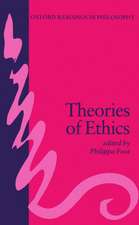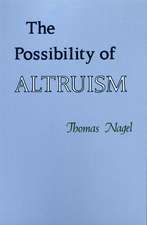Five Ways Patricia Can Kill Her Husband: A Theory of Intentionality and Blame
Autor Leo Zaiberten Limba Engleză Paperback – 18 aug 2005
The titular example of Patricia, a woman who kills her husband, illustrates this book’s powerful theory of culpability. Depending on Patricia’s mental state and beliefs, her degree of guilt for killing her husband will vary. If, for example, she set fire to her apartment fully intending to kill her husband, we would deem her more blameworthy that if the fire was an unavoidable accident. Culpability, the author argues, is commonly confused with other issues such as responsibility, accountability, and liability. Yet it is concerned exclusively with the intentional mental states we have at the time that we act. Zaibert also offers a history of the theory of culpability, and gives a fascinating analysis of the beliefs and emotions associated with blaming others.
Preț: 195.32 lei
Nou
Puncte Express: 293
Preț estimativ în valută:
37.38€ • 40.59$ • 31.40£
37.38€ • 40.59$ • 31.40£
Carte disponibilă
Livrare economică 01-15 aprilie
Preluare comenzi: 021 569.72.76
Specificații
ISBN-13: 9780812695762
ISBN-10: 0812695763
Pagini: 261
Dimensiuni: 155 x 228 x 18 mm
Greutate: 0.38 kg
Editura: Open Court Publishing Company
ISBN-10: 0812695763
Pagini: 261
Dimensiuni: 155 x 228 x 18 mm
Greutate: 0.38 kg
Editura: Open Court Publishing Company
Descriere
Structured around a striking conceit — the murder of a husband by his wife — this provocative book explores the heady relationship between mental states such as desires, beliefs, emotions, and above all, intentions — along with the normative assessment of wrongdoing. Depending on Patricia's mental state and beliefs, her degree of guilt for killing her husband will vary. If, for example, she set fire to her apartment fully intending to kill her husband, she would be deemed more blameworthy then if the fire was an unavoidable accident. Culpability, the author argues, is commonly confused with other issues such as responsibility, accountability, and liability, but it is really concerned exclusively with the intentional mental states that exist in the mind at the point of action. Zaibert also offers a history of the theory of culpability, and gives a fascinating analysis of the beliefs and emotions associated with blaming others.

















